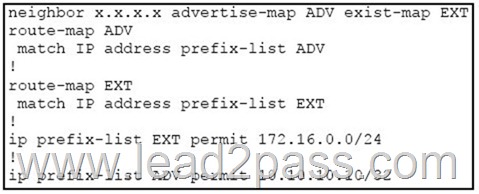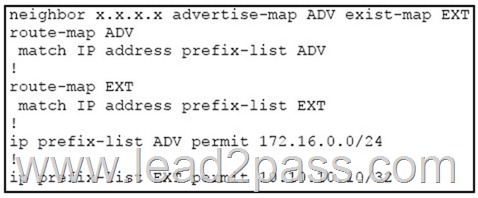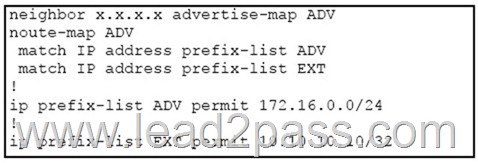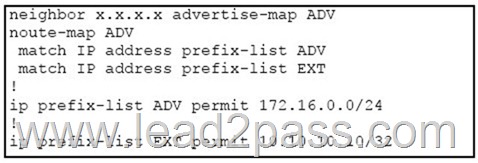2016 October Cisco Official New Released 400-101 Dumps in Lead2pass.com!
100% Free Download! 100% Pass Guaranteed!
Since I recently passed the the Cisco 400-101 exam, it’s time for me to share the Lead2pass exam dumps I used when preparing for this exam.
Following questions and answers are all new published by Cisco Official Exam Center: http://www.lead2pass.com/400-101.html
QUESTION 176
A TCP/IP host is able to transmit small amounts of data (typically less than 1500 bytes), but attempts to transmit larger amounts of data hang and then time out. What is the cause of this problem?
A. A link is flapping between two intermediate devices.
B. The processor of an intermediate router is averaging 90 percent utilization.
C. A port on the switch that is connected to the TCP/IP host is duplicating traffic and sending it to a port
that has a sniffer attached.
D. There is a PMTUD failure in the network path.
Answer: D
QUESTION 177
Refer to the exhibit. ICMP Echo requests from host A are not reaching the intended destination on host B. What is the problem? 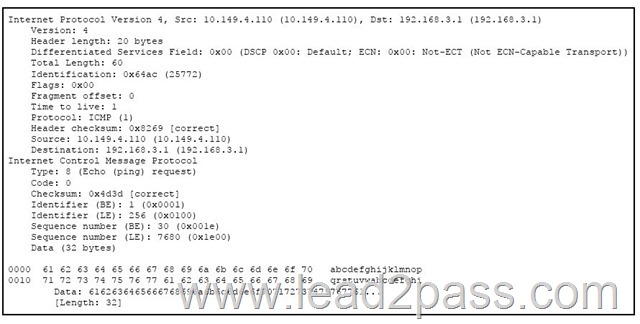
A. The ICMP payload is malformed.
B. The ICMP Identifier (BE) is invalid.
C. The negotiation of the connection failed.
D. The packet is dropped at the next hop.
E. The link is congested.
Answer: D
QUESTION 178
Refer to the exhibit. Which statement is true? 
A. It is impossible for the destination interface to equal the source interface.
B. NAT on a stick is performed on interface Et0/0.
C. There is a potential routing loop.
D. This output represents a UDP flow or a TCP flow.
Answer: C
QUESTION 179
Which three conditions can cause excessive unicast flooding? (Choose three.)
A. Asymmetric routing
B. Repeated TCNs
C. The use of HSRP
D. Frames sent to FFFF.FFFF.FFFF
E. MAC forwarding table overflow
F. The use of Unicast Reverse Path Forwarding
Answer: ABE
QUESTION 180
Drag and Drop Question 
Answer: 
QUESTION 181
Drag and Drop Question
Drag and drop the router preference on the left to the correct routing sequence (from most preferred to least preferred) on the right. 
Answer: 
QUESTION 182
Which congestion-avoidance or congestion-management technique can cause global synchronization?
A. Tail drop
B. Random early detection
C. Weighted random early detection
D. Weighted fair queuing
Answer: A
QUESTION 183
Which group of neighbors can be configured as a BGP peer group?
A. a group of iBGP neighbors that have the same outbound route policies
B. a group of iBGP and eBGP neighbors that have the same inbound distribute-list
C. a group of eBGP neighbors in the same autonomous system that have different outbound route policies
D. a group of iBGP neighbors that have different outbound route policies
Answer: A
QUESTION 184
Refer to the exhibit. Notice that debug ip bgp updates has been enabled. What can you conclude from the debug output? 
A. This is the result of the clear ip bgp 10.1.3.4 in command.
B. This is the result of the clear ip bgp 10.1.3.4 out command.
C. BGP neighbor 10.1.3.4 performed a graceful restart.
D. BGP neighbor 10.1.3.4 established a new BGP session.
Answer: A
QUESTION 185
In the DiffServ model, which class represents the lowest priority with the lowest drop probability?
A. AF11
B. AF13
C. AF41
D. AF43
Answer: A
QUESTION 186
Which set of commands conditionally advertises 172.16.0.0/24 as long as 10.10.10.10/32 is in the routing table?
Answer: B
QUESTION 187
Refer to the exhibit. Why is R2 unable to ping the loopback interface of R4? 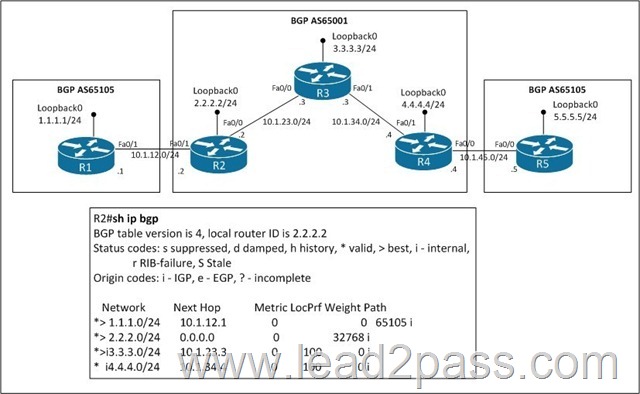
A. The local preference is too high.
B. The weight is too low.
C. The next hop is not reachable from R2.
D. The route originated from within the same AS.
Answer: C
QUESTION 188
Refer to the exhibit. Which two statements about the output are true? (Choose two.) 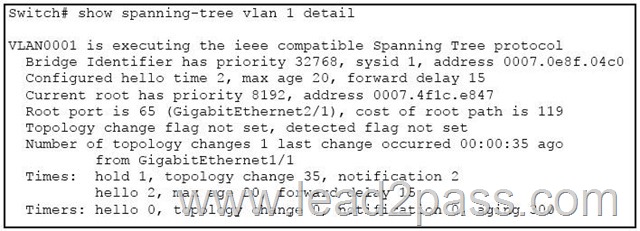
A. 802.1D spanning tree is being used.
B. Setting the priority of this switch to 0 for VLAN 1 would cause it to become the new root.
C. The hello, max-age, and forward delay timers are not set to their default values.
D. Spanning-tree PortFast is enabled on GigabitEthernet1/1.
Answer: AB
QUESTION 189
Which statement about the BGP originator ID is true?
A. The route reflector always sets the originator ID to its own router ID.
B. The route reflector sets the originator ID to the router ID of the route reflector client that injects the route
into the AS.
C. The route reflector client that injects the route into the AS sets the originator ID to its own router ID.
D. The originator ID is set to match the cluster ID.
Answer: B
QUESTION 190
Refer to the exhibit. Which two statements are true? (Choose two.) 
A. This router is not 4-byte autonomous system aware.
B. This router is 4-byte autonomous system aware.
C. The prefix 10.100.1.1/32 was learned through an autonomous system number with a length of 4 bytes,
and this router is 4-byte autonomous system aware.
D. The prefix 10.100.1.1/32 was learned through an autonomous system number with a length of 4 bytes,
and this router is not 4-byte autonomous system aware.
E. The prefix 10.100.1.1/32 was originated from a 4-byte autonomous system.
Answer: AD
QUESTION 191
Refer to the exhibit. Spanning tree protocol is running on all three switches. The switches are configured so that Link A is the active link, and Link B is the standby link. There is a problem occurring where Switch B starts forwarding on Link B causing a routing loop. 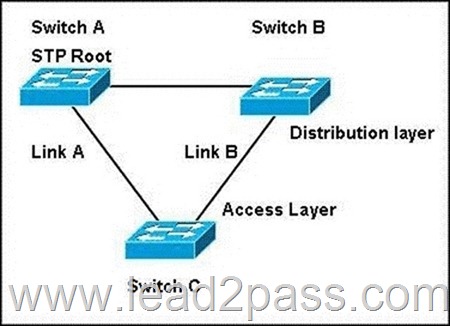
What is the likely cause of the problem?
A. PortFast is not enabled.
B. There is a port duplex mismatch.
C. MISTP is enabled without RSTP.
D. A single instance of STP is enabled instead of PVST.
Answer: B
QUESTION 192
While troubleshooting a BGP neighborship, you notice that the neighborship is constantly going up and down. What is causing the neighbors to flap?
A. The traffic-shaping and rate-limiting parameters are in correct.
B. There is a BGP timer mismatch between both neighbors.
C. There is a routing issue between both neighbors.
D. A firewall is blocking TCP packets with port 179.
E. There is a mismatch on the BGP update source between both neighbors.
F. EBGP multihop has not been configured on the neighbors.
Answer: A
QUESTION 193
Refer to the exhibit. An EBGP session is not established between Router1 and Router2. 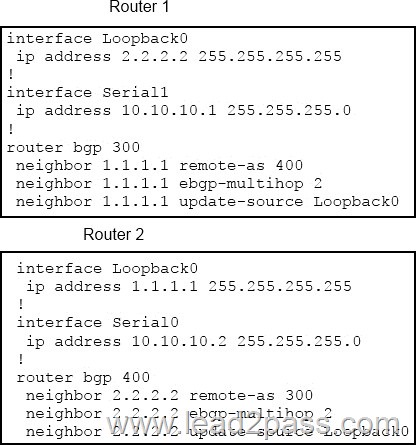
A. The ebgp-multihop value must be increased to 3.
B. A static route needs to be added on Router1 and Router2.
C. The update-source loopback 0 command needs to be removed.
D. Use the serial interface IP addresses in the neighbor command, but leave the update source
pointing to loopback 0.
Answer: B
QUESTION 194
While troubleshooting OSPF issues on a broadcast network, the network administrator notices that some routers are stuck in two-way state.
What is the cause of this issue?
A. This is normal on OSPF broadcast network types.
B. The network type is configured incorrectly on these routers
C. There is an MTU mismatch between these routers and their neighbors.
D. This only happens to routers that have their OSPF priority set to 0.
E. Hello packets are not being received on these routers.
Answer: A
QUESTION 195
Refer to the exhibit. You want to set up an AS path filter that allows networks that originated from AS4, and autonomous systems that are directly attached to AS4, to enter R1. When you tested the filter, you noticed that something was wrong with it. 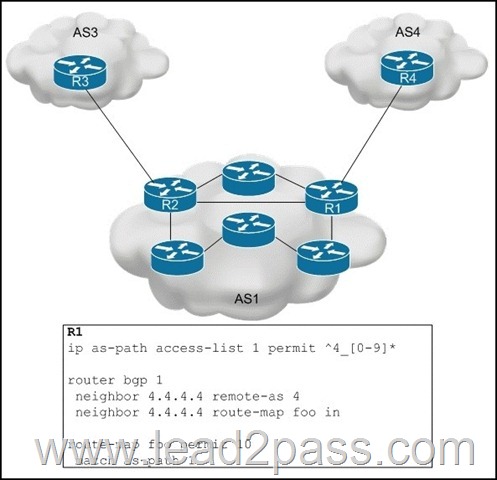
How can this be solved?
A. Change the regular expressing to ^4_0-9*$.
B. Change the regular expression to ^4_0-9+$.
C. Change the regular expression to ^4_0-9.*.
D. Change the regular expression to ^4_0-9.$.
Answer: A
QUESTION 196
Refer to the exhibit. While troubleshooting performance issues on your network, you notice that CPU utilization on your Layer 3 Internet switch is very high.
What can be done to solve this issue? 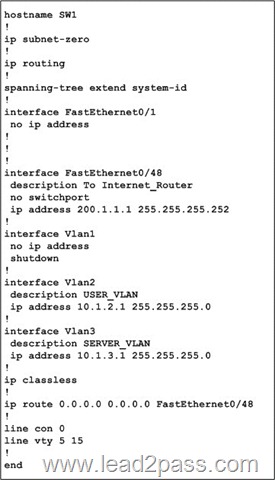
A. Use an SVI instead of a routed port to connect to the Internet router.
B. This is a capacity issue. Replace the switch with a high-performance Layer 3 switch.
C. Point the default static route to an IP address instead of a physical interface.
D. Configure CoPP on the Layer 3 switch.
Answer: C
QUESTION 197
Refer to the exhibit. While troubleshooting BGP in this network, you notice that routes are constantly flapping on R1.
What can be done to solve this issue? 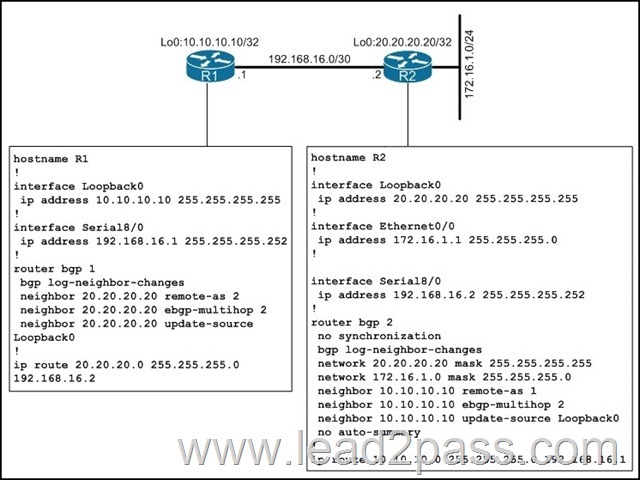
A. Disable synchronization on R1 so that routes from R2 are installed in the routing table.
B. Disable autosummary on R1 so that routes from R2 are installed in routing table.
C. Increase the EBGP multihop count to 3.
D. Replace the static route on R1 with a specific route to 20.20.20.20/32.
Answer: D
QUESTION 198
While troubleshooting an OSPFv3 neighborship between two routers on a Frame Relay network, you notice that there is a mapping issue.
Which mapping needs to be established for OSPFv3 to establish a neighborship on Frame Relay?
A. The all routers multicast address needs to be mapped to the correct DLCI.
B. The solicited node multicast address needs to be mapped to the correct DLCI.
C. The neighbor’s link-local address needs to be mapped to the correct DLCI.
D. The all routers broadcast address needs to be mapped to the correct DLCI.
Answer: C
QUESTION 199
Refer to the exhibit. R10 in area 3 is not able to reach EIGRP routes that have been redistributed into OSPF on R7.
Which two actions can be taken to resolve this issue, while maintaining connectivity to BGP routes that are redistributed on r11? (Choose two) 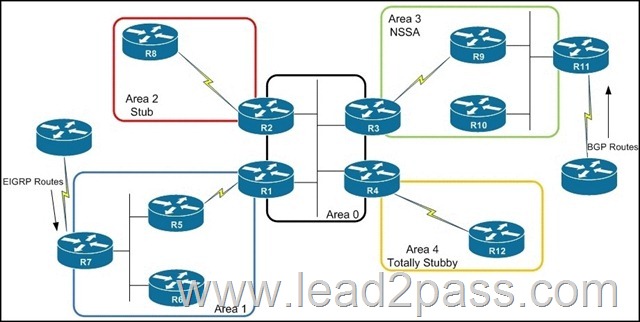
A. Change area 3 from NSSA to a stub area.
B. Change area 3 from NSSA to a totally stubby area.
C. Change area 3 from NSSA to a normal area.
D. Change area 3 from NSSA to an NSSA totally stub area.
Answer: CD
QUESTION 200
Refer to the exhibit. A host on the Internet (150.1.1.1) must be represented to the internal network as a local IP address. While testing, the configuration does not seem to work.
What is wrong? 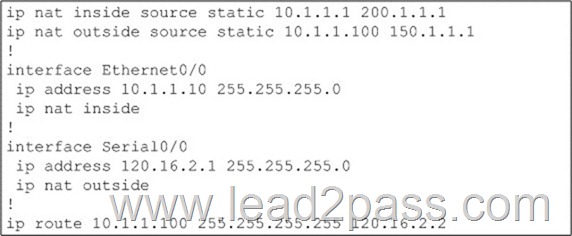
A. The nat inside translation is incorrect.
B. The static route is incorrect.
C. The nat outside translation is incorrect.
D. Instead of source nat, destination nat should be used on the inside.
E. The problem is not related to NAT configuration. The NAT configuration is correct.
Answer: C
I hope Lead2pass exam questions from the Cisco 400-101 exam helps you pass the exam and earn your Cisco certification! Happy Studying!
400-101 new questions on Google Drive: https://drive.google.com/open?id=0B3Syig5i8gpDU2RjeUlHTTZXb1U
2016 Cisco 400-101 exam dumps (All 1219 Q&As) from Lead2pass:
http://www.lead2pass.com/400-101.html [100% Exam Pass Guaranteed]
